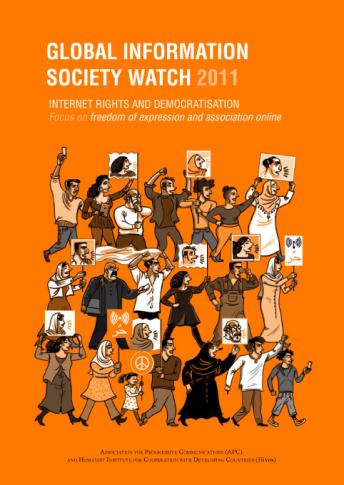
APC and Hivos investigate how governments and internet and mobile phone companies are restricting freedom online – and how citizens are responding using the very same technologies.
Everyone is familiar with the stories of Egypt and Tunisia. GISWatch authors tell these and other lesser-known stories from over 50 countries including:
PRISON CONDITIONS IN ARGENTINA Prisoners are using the internet protest living conditions and demand respect for their rights.
TORTURE IN INDONESIA The torture of two West Papuan farmers was recorded on a mobile phone and leaked to the internet. The video spread to well-known human rights sites sparking public outrage and a formal investigation by the authorities.
THE TSUNAMI IN JAPAN Citizens used social media to share actionable information during the devastating tsunami, and in the aftermath online discussions contradicted misleading reports coming from state authorities.
Other countries include China, Iran, Lebanon and Pakistan.
“Written by internationally-renowned experts, the report brings its readers easy-to-read and yet comprehensive articles, many with policy proposals, on the most important challenges protecting human rights on the internet is facing today,” says lawyer Matthias C. Kettemann, co-chair of the Internet Rights and Principles Coalition. “The report’s country studies –which are in turn saddening, moving, uplifting— shed light on how the internet can truly be a catalyst for change – and how it can be misused.”
In his preface to the report Frank La Rue, UN Special Rapporteur on freedom of opinion and expression says “GISWatch 2011 offers timely commentary on the future of the internet as an open and shared platform that everyone has the right to access.”
GISWatch 2011 also includes expert reports from:
-
Egyptian blogger Ramy Raoof on the the role of the internet in the wave of recent social resistance in North Africa
-
Alex Comninos on revolutions and cyber crackdowns in the Middle East and North Africa
-
Ron Deibert (OpenNet Initiative) on cyberwarfare and counter-terrorism: implications for an open and free internet
-
Joe McNamee (EDRI) on internet intermediaries – the border control guards who get to monitor and censor your content simply because they host your information
Global Information Society Watch 2011: Internet rights and democratisation – Focus on freedom of expression and association online
Published by the Association for Progressive Communications (APC) and Hivos